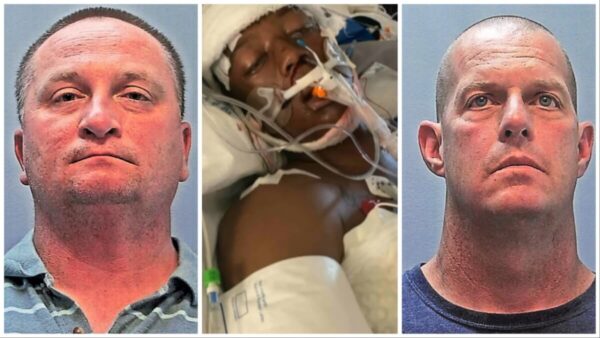Defense Medical Expert Says Ketamine Dose Did Not Kill Elijah McClain as Lawyers Argue Innocence of Medics on Trial for His Death
A medical expert testifying for the defense of two paramedics accused of causing 23-year-old Elijah McClain‘s death said he doesn’t believe the ketamine dose the pair gave McClain contributed to his death.
The defense started presenting their case last week for Aurora Fire Department paramedics Jeremy Cooper, and Lt. Peter Cichuniec, who was charged with reckless manslaughter, criminally negligent homicide, and three counts each of second-degree assault in connection to McClain’s death.
They’re being tried to determine if the injection of ketamine they gave McClain three years ago following a struggle with Aurora police that sent him to the hospital ultimately killed him.
During an encounter with three police officers on Aug. 24, 2019, McClain was forced to the ground, handcuffed, and put in a neck hold that restricted oxygen flow to his brain and caused him to lose consciousness briefly. He even vomited into his ski mask as he was being restrained. He was returning from a convenience store that night buying iced tea when someone called police about a “suspicious person” in a ski mask.
During his transport to the hospital, the medics decided to administer a 500-milligram dose of ketamine, a sedative used for anesthetizing pain. However, they never asked or consulted McClain about the dose, and he ended up going into cardiac arrest and stopped breathing just a few minutes after receiving it. A doctor declared him brain-dead three days later.
According to the Denver Gazette, Kennon Heard, an emergency physician and toxicologist at UCHealth, pointed to Aurora paramedic protocols that indicate that 500 milligrams of ketamine were more than what McClain’s body weight called for. That dose would have been more appropriate for someone who weighs roughly 80 pounds more than McClain.
However, Heard also said respiratory arrest is a rare and extreme possible side effect of ketamine and concluded that McClain’s death was accidental.
“I would not expect life-threatening effects from this amount of ketamine,” Heard told the jury.
Heard never approximated what constitutes a fatal dose. On cross-examination, one prosecutor asked Heard if people can die from expected side effects if they don’t receive the proper intervention or treatment, to which Heard said, “Yes.”
Prosecutors argued that Cooper and Cichuniec decided to administer ketamine because they solely relied on the police officers’ account of McClain’s behavior. Bodycam footage revealed that one officer said McClain showed extreme strength, implying he had to be “on something.” Aurora paramedics are reportedly trained to administer ketamine to patients suffering from a syndrome called “excited delirium.”
This condition isn’t one that’s recognized by the American Medical Association or the American Psychiatric Association, and even the Colorado Licensing Board for Peace Officers voted to remove the term from training documents.
Another medical expert testifying on behalf of the defense said that the blame should be on the officers rather than the medics. That forensic pathologist, Ljubisa Dragovic, determined McClain died from brain damage caused by inhaling his own vomit.
Both Heard’s and Dragovic’s conclusions contradict one doctor who conducted the autopsy for McClain and another who testified for the prosecution.
Dr. Stephen Cina, with the coroner’s office, initially determined McClain’s cause and manner of death were both “undetermined” until he reviewed bodycam footage. He amended his previous conclusion and determined that ketamine contributed to McClain’s death. Dr. Roger Mitchell determined McClain’s cause of death as “complications following acute ketamine administration during violent subdual and restraint by law enforcement and emergency response personnel.”
Cooper and Cichuniec also faced second-degree assault with a deadly weapon and a sentence-enhancing count also involving a deadly weapon, but a judge dismissed those counts after their defense counsel successfully argued that ketamine can’t be considered a deadly weapon.
A source told CNN it’s uncommon for paramedics to be held responsible for patient deaths like this but the coroner’s report and the dose of ketamine raise questions about whether Cooper or Cichuniec are criminally liable for negligence or wanton behavior.
In another case, two Illinois paramedics are facing murder charges for allegedly improperly restraining a man in an ambulance, which led to his death last year. An autopsy determined the man’s cause of death was “compressional and positional asphyxia due to prone facedown restraint on a paramedic transportation cot by tightened straps across the back and lower body.”
The three officers who were involved in the struggle with Elijah McClain — Randy Roedema, Jason Rosenblatt, and Nathan Woodyard — did stand trial for McClain’s death. Roedema was found guilty of criminally negligent homicide and third-degree assault and will be sentenced in January. Rosenblatt and Woodyard were acquitted of all charges. Woodyard is eligible to return to restricted duty with the Aurora Police Department.

